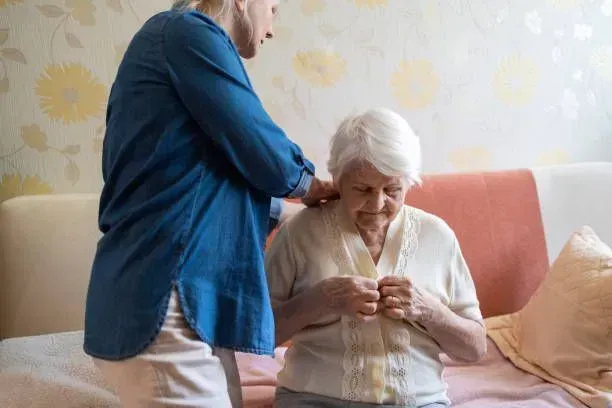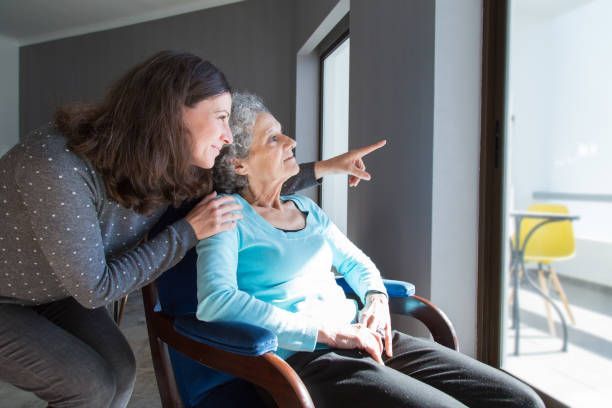How Should a Person with Dementia Be Assisted with Dressing?
How Should a Person with Dementia
Be Assisted with Dressing?
Engaging a home care agency highly experienced in Alzheimer's and dementia care offers extraordinary benefits, ensuring compassionate, specialized support tailored to the unique needs of individuals with cognitive impairments. These agencies provide trained caregivers who utilize best practices to manage symptoms, promote safety, and enhance the quality of life. They create structured routines to reduce confusion and anxiety, offer personalized care plans that adapt to the individual's changing needs, and deliver emotional support and respite for families. By fostering a comfortable, familiar environment, these expert caregivers help maintain the dignity, independence, and overall well-being of their clients, allowing them to live fulfilling lives at home. 7 Day Home Care is licensed by the New York State Department of Health to provide home care services in Manhattan, Queens, Brooklyn, Nassau County, and Suffolk County, New York.

Are You Searching for a Home Care Agency Near Me
with Experience in Alzheimer's and Dementia Care?
Alzheimer’s disease and dementia are challenging conditions that affect a person’s cognitive abilities, impacting their daily routines and activities. Dressing, a seemingly simple task, can become particularly difficult and frustrating for individuals with these conditions. Caregivers play a crucial role in providing support and assistance to ensure that the person can maintain their dignity, comfort, and independence as much as possible. This article will offer a comprehensive guide on how to assist a person with Alzheimer’s or dementia with dressing, focusing on practical strategies, empathy, and patience.
Understanding Alzheimer’s and Dementia
Impact on Cognitive and Physical Abilities
Alzheimer’s and other forms of dementia primarily affect memory, reasoning, and judgment. As the disease progresses, individuals may:
- Forget the purpose of clothing or how to dress.
- Struggle with the sequence of dressing steps.
- Experience difficulty with fine motor skills, making buttons, zippers, and other fasteners challenging.
- Become confused or agitated by unfamiliar clothing or environments.
Importance of Routine and Familiarity in Dementia Care
Establishing a consistent daily routine can help reduce confusion and anxiety for individuals with Alzheimer’s or dementia. Dressing should be incorporated into a regular schedule, ideally at the same time each day, in a familiar and comfortable environment. Familiarity with the routine and setting can help ease the process and provide a sense of security.
Preparing the Environment
Creating a Calm and Safe Space is Critical in Dementia Care
A calm, quiet, and safe environment is essential for assisting with dressing. To create an appropriate space:
- Minimize Distractions: Turn off the television and radio, and close the door to avoid interruptions.
- Ensure Good Lighting: Adequate lighting can help the individual see and understand what they are doing.
- Provide Comfortable Seating: A sturdy chair or bench can help the person sit while dressing, reducing the risk of falls and making the process more comfortable.
Organizing Clothing for Dementia Care
Organizing clothing in a clear and accessible way can make the dressing process smoother. Consider the following tips:
- Simplify Choices: Too many options can be overwhelming. Limit the selection to two or three outfits to make decision-making easier.
- Lay Out Clothing in Order: Arrange clothing in the order it should be put on, from undergarments to outer layers. This visual cue can guide the individual through the process.
- Use Labels: Label drawers and shelves with pictures or words to indicate their contents, helping the person identify and locate items more easily.
Dementia Care and Choosing Appropriate Clothing
Selecting the right clothing is crucial for comfort, ease, and maintaining dignity. When choosing garments, consider the following factors:
Comfort and Ease
- Soft Fabrics: Choose soft, comfortable fabrics that are easy to put on and take off. Avoid scratchy or tight-fitting materials.
- Simple Designs: Opt for clothing with minimal fasteners. Elastic waistbands, Velcro closures, and slip-on shoes can simplify the dressing process.
- Adaptive Clothing: Specialized adaptive clothing designed for individuals with mobility or cognitive impairments can be particularly helpful.
Weather-Appropriate Clothing
Ensure clothing is suitable for the current weather conditions to prevent overheating or cold discomfort. Layering can be a practical approach, allowing the individual to add or remove garments as needed.
Personal Preferences and Familiarity
Respect the individual's preferences and style. Familiar and favorite clothing items can provide comfort and a sense of identity. Allowing them to choose their outfit from a limited selection can also help maintain their autonomy.
Step-by-Step Assistance with Dressing for Alzheimer's and Dementia Care
Establishing a Connection
Before starting the dressing process, establish a connection with the individual:
- Approach Calmly: Approach them calmly and with a positive attitude. Use their name, make eye contact, and smile.
- Explain the Process: Explain what you will be doing in simple, reassuring terms. For example, say, “Let’s get you dressed now. We’ll start with your shirt.”
Breaking Down the Task
Breaking down the dressing task into smaller, manageable steps can make it less overwhelming:
- Provide Clear Instructions: Use clear, concise instructions for each step. For example, say, “Let’s put your arm through this sleeve first.”
- Demonstrate Actions: Demonstrate each step if necessary, showing them how to perform the action.
Encouraging Independence
Encouraging independence is important for maintaining the individual’s dignity and self-esteem:
- Allow Them to Help: Allow the person to do as much as they can on their own, even if it takes longer or is not perfect.
- Offer Gentle Guidance: Offer gentle guidance and assistance only when needed. For example, guide their hand to the correct part of the garment or help with tricky fasteners.
Providing Physical Assistance
When physical assistance is necessary, be gentle and respectful:
- Explain Your Actions: Always explain what you are doing before you do it. For example, say, “I’m going to help you with your pants now.”
- Move Slowly: Move slowly and avoid sudden movements that might startle or upset the individual.
Using Positive Reinforcement
Positive reinforcement can encourage cooperation and boost morale:
- Praise Efforts: Praise the individual for their efforts, no matter how small. Use positive language and expressions of encouragement, such as, “Great job! You did that so well.”
Dementia Care Specific Techniques for Dressing
Putting on a Shirt or Blouse
- Preparation: Lay the shirt or blouse out in front of the individual, fully unbuttoned.
- Guiding Arms: Gently guide one arm through the sleeve, then the other. Encourage the individual to assist as much as possible.
- Pulling Over the Head: If it is a pullover shirt, gently guide it over the head, taking care not to pull hair or earrings.
- Buttoning: If there are buttons, assist with fastening them, or choose clothing with Velcro or magnetic closures for ease.
Putting on Pants or Skirt
- Preparation: Lay the pants or skirt in front of the individual, with the waistband open.
- Guiding Legs: Help them sit down if needed. Guide one leg into the pants or skirt, then the other.
- Pulling Up: Encourage the individual to pull up the pants or skirt themselves, assisting only if necessary.
- Fastening: Assist with buttons, zippers, or other fasteners, or choose elastic waistbands for simplicity.
Putting on Socks and Shoes
- Socks: Lay the socks out in front of the individual. Guide their toes into the sock and pull it up gently. Encourage them to help as much as possible.
- Shoes: Choose slip-on shoes or those with Velcro straps. Guide their foot into the shoe and secure it comfortably.
Addressing Common Challenges in Alzheimer's and Dementia care
Resistance and Agitation
Resistance and agitation during dressing are common in individuals with Alzheimer’s or dementia. To manage these behaviors, consider the following strategies:
- Stay Calm: Remain calm and patient. Speak softly and reassuringly.
- Identify Triggers: Pay attention to what might be triggering the agitation. Is the clothing uncomfortable? Is the environment too noisy?
- Offer Choices: Give the individual a sense of control by offering simple choices, such as “Would you like to wear the blue shirt or the green shirt?”
- Take Breaks: If the individual becomes too agitated, take a break and try again later.
Difficulty with Fasteners
Fasteners like buttons, zippers, and shoelaces can be challenging for individuals with Alzheimer’s or dementia. Simplify the process by:
- Using Adaptive Clothing: Choose clothing with Velcro, magnetic closures, or elastic waistbands.
- Modifying Existing Clothing: Replace traditional fasteners with easier alternatives, such as Velcro or large buttons.
- Providing Assistive Devices: Use tools like button hooks or zipper pulls to make fasteners more manageable.
Sensory Issues
Sensory changes can affect how individuals with Alzheimer’s or dementia perceive textures and temperatures. To address these issues:
- Choose Comfortable Fabrics: Opt for soft, breathable fabrics that feel comfortable against the skin.
- Layer Clothing: Layer clothing to adjust for temperature changes easily. Ensure the individual is neither too hot nor too cold.
- Be Mindful of Sensitivities: Pay attention to any signs of discomfort or sensitivity to certain fabrics or clothing items.
Involving the Individual with Dementia in the Process
Encouraging Participation
Involving the individual in the dressing process can promote independence and a sense of control. Encourage them to:
- Select Clothing: Offer simple choices between two or three outfits.
- Assist with Dressing: Encourage them to perform tasks they can manage, such as putting on socks or pulling up pants.
- Provide Feedback: Ask for their preferences and listen to their feedback about comfort and fit.
Adapting to Changing Abilities
As Alzheimer’s or dementia progresses, the individual’s abilities may change. Be prepared to adapt your approach and the level of assistance you provide. Regularly assess their abilities and adjust the dressing process accordingly.
Using Visual and Verbal Cues
Visual and verbal cues can guide the individual through the dressing process. Demonstrate each step and provide clear, concise instructions. For example, show them how to put on a shirt by mimicking the action yourself.
Alzheimer's and Dementia Care Requires Maintaining Dignity and Respect
Preserving Dignity
Preserving the individual’s dignity is paramount. Ensure they feel respected and valued throughout the dressing process by:
- Respecting Privacy: Provide as much privacy as possible. Close doors and draw curtains if necessary.
- Communicating Respectfully: Use respectful language and avoid talking down to the individual.
- Protecting Modesty: Keep them covered as much as possible during the process to protect their modesty.
Building Trust
Building trust is essential for a positive dressing experience. Establish a rapport with the individual by:
- Being Consistent: Stick to a routine and provide consistent care.
- Showing Empathy: Show understanding and empathy for their feelings and frustrations.
- Listening: Listen to their concerns and preferences, and involve them in decisions about their care.
Assisting a person with Alzheimer’s or dementia with dressing requires patience, compassion, and flexibility. By creating a calm and organized environment, choosing appropriate clothing, breaking down the task into manageable steps, and maintaining dignity and respect, caregivers can significantly improve the dressing experience for their loved ones.
Each individual with Alzheimer’s or dementia is unique, and their needs and abilities will change over time. Caregivers should remain attentive to these changes and be willing to adapt their approach as necessary. With the right strategies and a caring attitude, dressing can become a positive and manageable part of daily life, contributing to the overall well-being and quality of life for those living with Alzheimer’s or dementia. Contact us at 516-408-0034, to learn more about our Alzheimer's and Dementia in-home care services near you in Manhattan, Queens, Brooklyn, and Long Island, New York.
Brian Callahan
7 Day Home Care










